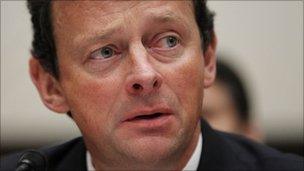Profile: BP's Tony Hayward
- Published

Tony Hayward has been fiercely criticised by the US media
BP chief executive Tony Hayward, who is to leave BP's top job in October, has been heavily criticised for his handling of the Gulf of Mexico oil leak and for what some see as a series of public relations gaffes.
When Tony Hayward, 53, became BP's chief executive in 2007 he told journalists his number-one task was to focus "laser-like" on safety and reliability.
He showed all the energy and excitement one would expect from a man who had climbed to the top of one of the world's biggest companies - and could now stamp his mark on it.
He inherited a company severely tarnished by the deaths of 15 employees at a refinery in Texas and by an oil spillage from a fractured pipeline in Alaska.
But Mr Hayward promised BP would do things differently, telling the Texas-based Houston Chronicle newspaper: "The task is to restore confidence."
How quickly things change. He was then aged 50, but looking much younger. The excitement he showed in the early days of his tenure seems absent today.
No wonder, after being declared public enemy No 1 in America.
Hostility
Mr Hayward has been demonised by the US media as being responsible for the world's worst environmental disaster - and, let's not forget, for the deaths of 11 men in the rig explosion that preceded it.
Critics argued that, as the man in charge, it was Mr Hayward's job to take the heat. He did not help his cause with some misguided remarks about wanting his life back and optimistic comments about the clean-up operation.
Other public relations own-goals included his refusal to answer questions put to him by a congressional sub-committee and his decision to participate in a JP Morgan yacht race around the Isle of Wight.
The hostility must have been a crushing weight to bear, especially for a man whose declared intention on becoming chief executive was to adopt a lower profile than his predecessor, Lord (John) Browne of Madingley.
Mr Hayward scored a number of public relations own-goals
By the time he departed, Lord Browne had become as well known for his celebrity friends and political connections as for his business successes.
Mr Hayward's appointment reflected in part a desire by the BP board to get back to basics.
He was seen as a old-school oil man, happier having a beer with rig workers than, like Lord Browne, drinking fine wine with prime ministers and presidents.
Words such as "informal", "quiet" or "easy-going" are often used to describe his manner.
Born in 1957, the eldest of seven children, Mr Hayward gained a first class geology degree from Aston University in Birmingham, and a PhD from Edinburgh University at the age 22.
Married, with two children, Mr Hayward considered going into academia, but instead went to BP in 1982 and was posted first to Aberdeen, home of the UK's North Sea oil boom.
Mr Hayward has spoken frequently of his love of the offshore life and of touring the world in various BP jobs.
But he was eventually talent-spotted by Lord Browne, and became one of his Turtles (a name Browne gave to his inner circle of high fliers) - a reference to the fearsome cartoon warriors, the Teenage Mutant Ninja Turtles.
Mr Hayward rose to become head of exploration and production, a key role in any oil company, and was long identified as Lord Browne's likely successor.
When Lord Browne resigned, having lied to a UK court about his relationship with a male escort, no-one was surprised that Mr Hayward took over.
But he had already begun positioning himself, telling a conference some months earlier that BP needed to change its leadership style because it was "too directive and doesn't listen sufficiently well."
- Published20 June 2010